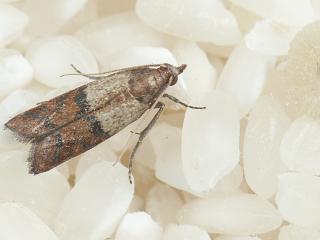Stored product moths
There are three major storage moths in Western Australia: the Indian meal moth (Plodia interpunctella), the Mediterranean flour moth (Ephestia kuehniella) and the tropical warehouse moth (Ephestia cautella). The Indian meal moth is one of the most common moth pests found in home groceries.
This moth, which has a wingspan of about 15mm, is the parent of the pinkish-white grubs often found in food such as raisins, dates and figs. The grubs also have been known to feed on biscuits, powdered milk and chocolate. They contaminate foodstuffs with webbing. The larvae grow to 17mm long, with a dark head capsule and three pairs of legs. The moth lays eggs on or near foodstuffs. The life cycle usually takes one to three months.
Prevention
Absolute cleanliness in and around food storage areas is essential in preventing infestation. Thoroughly clean up any spilt foodstuffs, preferably using a vacuum cleaner. Pay particular attention to cracks and crevices.
Purchasing small quantities of foodstuffs at a time, keeping them cool, and storing them in containers with close fitting lids can help prevent insect attack and spread.
Often, infestation can be traced to an old packet of dried fruit, flour or spices which has been pushed to the back of a cupboard and forgotten. Destroy all such centres of breeding by placing small quantities of infested material in plastic bags in the freezer compartment of a refrigerator for 48 hours to kill the insects.
Thoroughly clean insect-infested cupboards or pantries and spray them with surface sprays which contain insecticides. Avoid contaminating food, food preparation surfaces, utensils or humans with the spray. After using any spray, air the cupboards for 12 hours before replacing foodstuffs. Space sprays containing pyrethrins are also effective in controlling wandering adult insects in surrounding areas. This prevents them from recontaminating foodstuffs during the airing phase.
An alternative to insecticides is a pantry moth trap. These contain a pheromone lure that attracts the moths and a sticky trap that captures the pests. Moths find traps placed within 3m of the infested food source.
Treatment
You can treat small quantities of food if the insect damage does not require it to be destroyed. Put it in the oven for at least an hour bringing the temperature up to 55–60ºC but no hotter. Gradual heating will raise all material to the desired temperature, but short intense heating may spoil the commodity being treated. During hot summer weather, spreading the material thinly on an iron tray and placing it in the sun for several hours will also kill the pests.
If larger quantities of food need to be treated, see a registered pest controller with a view to fumigation.
Biosecurity message
The khapra beetle (Trogoderma granarium) is an exotic pest not present in Australia and is considered the world’s most destructive pest of stored grains and grain products.
If you discover this pest or its larva in any of your stored grain or grain products contact the Pest and Disease Information Service on free call 1800 084 881 or email info@agric.wa.gov.au
Khapra beetle
The khapra beetle larvae are up to 7mm long. They are yellowish at first, then the colour darkens with each moult to red-brown. Adults are oval, dark brown beetles about 2.5mm long with yellow-brown to red-brown markings on the wing covers. The larvae and their cast skins are the most conspicuous feature of a khapra beetle infestation.
Feeding is usually concentrated over the surface of infested materials and down the sides of bins, but may penetrate six metres or more into bulk storage.
The beetle is typically a pest of hot dry climates and it is likely that khapra would also get a foothold in Western Australia if quarantine violations occur.
To learn more about this pest, please refere to the khapra beetle webpage.

